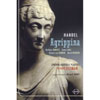Handel Agrippina
Wrong singers, wrong ending – but the right production
View record and artist detailsRecord and Artist Details
Composer or Director: George Frideric Handel
Genre:
DVD
Label: Euroarts
Magazine Review Date: 3/2006
Media Format: Digital Versatile Disc
Media Runtime: 154
Mastering:
Stereo
Catalogue Number: 2054538

Tracks:
| Composition | Artist Credit |
|---|---|
| Agrippina |
George Frideric Handel, Composer
Arnold Õstman, Conductor Barbara Daniels, Agrippina, Soprano Carlos Feller, Lesbo, Baritone Claudio Nicolai, Otho, Baritone David Kuebler, Nero, Tenor Eberhard Katz, Narcissus George Frideric Handel, Composer Günter von Kannen, Claudius, Bass Janice Hall, Poppea, Soprano London Baroque Players Ulrich Hielscher, Pallas |
Author: David Vickers
The libretto for Handel’s only Venetian opera is one of the best the composer set, but my heart sank when I read that in this production the ‘parts originally written for castrati…are recast for male voices, in the interests of verisimilitude’, and that ‘the changed ending is permissible’. In the event, Michael Hampe’s Baroque-style staging is entertaining, with action based closely on the contours of Handel’s music and containing good-natured humour that never threatens to obstruct the drama. The changed ending – making it pertinent to the 1985 Cologne audience – is the only dramatic aspect that arouses disapproval: in the rewritten final scene, Claudio has the last laugh by sending Ottone off to the German frontier. Evidently Poppea will require consolation in her husband’s absence.
This potentially excellent production is ruined by musical problems. None of these can be blamed on the theatrically charged musical direction of Arnold Östman or the magnificent performance of the London Baroque Players (a Baroque incarnation of Roger Norrington’s London Classical Players). Some awful singing is committed in the name of ‘verisimilitude’. The botched vocal parts sit uncomfortably with Handel’s orchestrations. David Kuebler’s tenor Nero isn’t the spoilt child that Handel’s music portrays. Worst of all, a bluff and hearty baritone Otho is complete miscasting for a role that Handel invested so strongly with melodious melancholy: ‘Voi che udite’ and ‘Vaghe fonti’ are butchered by singing which would better suit Mozart’s Commendatore (a crying shame because the orchestra produces wonderful accompaniments).
The casting is acceptable when it follows Handel’s intended voice ranges, although Claudius’s ‘Vieni, o cara’ should be genuinely seductive instead of ludicrously comic as it is here. Janice Hall’s Poppea has enough flirtatious vanity but lacks the irresistible vocal charm the music, and her many suitors, suggest. Barbara Daniels’s powerhouse display in the title-role is some consolation and her recitatives are superbly delivered. Most of Östman’s direction is crisp, sonorous and theatrically persuasive but quite a few da capo arias are shortened to only their first sections. The appealing use of period instruments and a gorgeous rococo theatre seem wasted when several singers spectacularly fail to hit the mark when miscast in the wrong octave.
This potentially excellent production is ruined by musical problems. None of these can be blamed on the theatrically charged musical direction of Arnold Östman or the magnificent performance of the London Baroque Players (a Baroque incarnation of Roger Norrington’s London Classical Players). Some awful singing is committed in the name of ‘verisimilitude’. The botched vocal parts sit uncomfortably with Handel’s orchestrations. David Kuebler’s tenor Nero isn’t the spoilt child that Handel’s music portrays. Worst of all, a bluff and hearty baritone Otho is complete miscasting for a role that Handel invested so strongly with melodious melancholy: ‘Voi che udite’ and ‘Vaghe fonti’ are butchered by singing which would better suit Mozart’s Commendatore (a crying shame because the orchestra produces wonderful accompaniments).
The casting is acceptable when it follows Handel’s intended voice ranges, although Claudius’s ‘Vieni, o cara’ should be genuinely seductive instead of ludicrously comic as it is here. Janice Hall’s Poppea has enough flirtatious vanity but lacks the irresistible vocal charm the music, and her many suitors, suggest. Barbara Daniels’s powerhouse display in the title-role is some consolation and her recitatives are superbly delivered. Most of Östman’s direction is crisp, sonorous and theatrically persuasive but quite a few da capo arias are shortened to only their first sections. The appealing use of period instruments and a gorgeous rococo theatre seem wasted when several singers spectacularly fail to hit the mark when miscast in the wrong octave.
Discover the world's largest classical music catalogue with Presto Music.

Gramophone Digital Club
- Digital Edition
- Digital Archive
- Reviews Database
- Full website access
From £8.75 / month
Subscribe
Gramophone Full Club
- Print Edition
- Digital Edition
- Digital Archive
- Reviews Database
- Full website access
From £11.00 / month
Subscribe
If you are a library, university or other organisation that would be interested in an institutional subscription to Gramophone please click here for further information.




